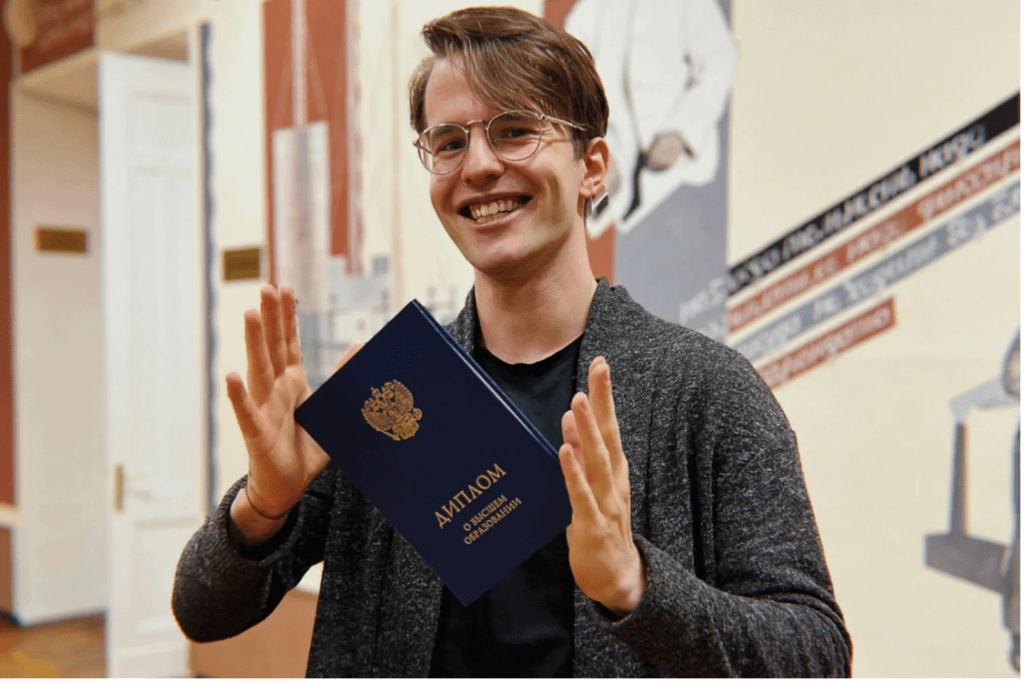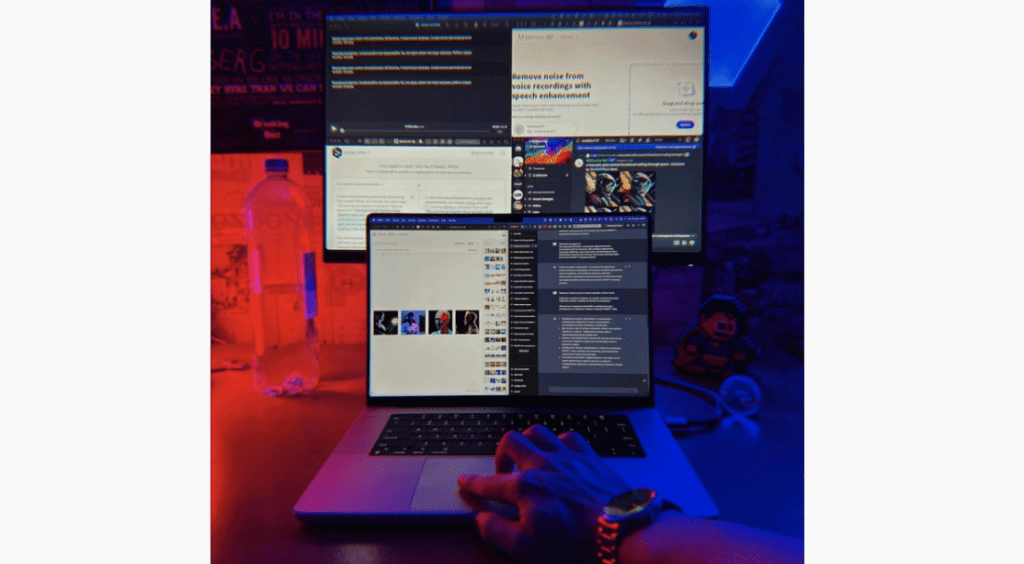“Of course, she was shocked”: Alexander Zhadan on how he found his bride thanks to ChatGPT
By Alexander Perchatkin
Around a year ago, a senior BA student, Alexander Zhadan, made headlines when the Russian Humanities Institute accepted his thesis, entirely composed with the aid of ChatGPT. This achievement sparked widespread interest in the intersection of AI and academia. Fast forward to this year, and Zhadan’s romantic escapades have once again drawn attention. His tale of meeting his girlfriend, Karina, on Tinder—facilitated by AI—was also mentioned in the news reports worldwide.
In a conversation with Alexander, we delved into the details of his AI-driven experiences. Additionally, Zhadan graciously granted access to materials and photos featured in publications by Skillbox and the RBK Group.

//Skillbox, 2023
In a world dominated by dating apps and endless swiping, Alexander Zhadan dared to challenge the status quo. Tired of the repetitive conversations and fruitless interactions that characterized his online dating experience, Zhadan embarked on a mission to revolutionize the way people find love. His weapon of choice? Artificial intelligence.
Zhadan’s journey began in the summer of 2022, when he first delved into the world of the GPT API. At that time, ChatGPT, the language model that would later become his ally in the pursuit of love, had not yet been developed. Frustrated by the monotony of traditional dating apps, Zhadan saw an opportunity to leverage AI technology to streamline the process of finding a compatible partner.
“It always boiled down to the same things initially and most of the time led nowhere,” Zhadan explained. “So, I decided to try using artificial intelligence to find a suitable person for me.”
Over the course of a year and a half, Zhadan meticulously crafted and refined his algorithm, transforming it from a rudimentary concept into a sophisticated tool for virtual matchmaking. Drawing from his background in management and his experience in gamedev, Zhadan honed his skills in neural networks, ultimately graduating from RGU in 2023 with a degree that would catapult him into the national spotlight.
“I defended my diploma with the help of ChatGPT, which made me famous, probably nationwide,” Zhadan reflected.
Zhadan spent less than a day on his diploma, fully completing it with the assistance of ChatGPT. He utilized the chatbot to generate a plan and then refine the content based on university guidelines, with his scientific supervisor initially unaware of the AI’s involvement. According to Zhadan, his experiment aimed to test whether people would detect the AI’s influence and whether the resulting work would be deemed suitable for defense.
Despite initial challenges and revisions to meet the university’s criteria for originality, Zhadan ultimately defended his diploma successfully. The defense, while mostly uneventful, faced minor disruptions such as laughter from the audience during another graduate’s presentation. Zhadan believes his grade was reduced due to factors like discussing a European gaming company instead of a Russian one and perhaps his behavior during the defense. Back in 2023, his story underscored broader discussions in media around academic integrity, the integration of AI in educational tasks.

//Meduza
Soon after graduating, armed with his newfound expertise, Zhadan set out to train his artificial intelligence for the realm of online dating. Using cleaned-up dialogues from Tinder as a foundation, he painstakingly crafted a language model that could navigate the intricacies of virtual courtship. The early iterations were far from perfect, with the AI occasionally producing responses that felt robotic and impersonal. However, through trial and error, Zhadan succeeded in imbuing his creation with a level of personalization that mirrored his own communication style.
“The bot responded super sweetly, I don’t communicate like that in chats,” Zhadan remarked, highlighting the challenges of aligning the AI’s responses with his own personality.
Despite the initial hurdles, Zhadan’s efforts proved fruitful. His algorithm analyzed over 14,000 profiles and selected just over 5,000 potential matches. The culmination of his experiment? Approximately 100 real-life meetings, each facilitated by the virtual wingman he had created.
While Zhadan’s project held the potential to disrupt the dating app landscape, he ultimately chose not to pursue it as a mass-market application. “It’s difficult to turn this into a mass product because this program was made on the fly and only for me,” Zhadan explained. “In total, I spent about 200,000 rubles (around 2,000$ – editor’s note) on the entire project.”
The revelation of Zhadan’s AI-driven courtship invariably raises eyebrows, particularly among those who question the authenticity of relationships facilitated by technology. When his romantic interest, Karina, discovered the unconventional genesis of their acquaintance, she was understandably taken aback. Yet, Zhadan’s transparency and willingness to address her concerns fostered an atmosphere of trust and understanding. “She was shocked,” Zhadan recalls. “Of course, for some important emotional moments in the chat, I always responded myself.”

// RBK, screenshot from Zhadan’s social media
Critics have accused Zhadan of adopting a consumerist attitude towards dating, suggesting that his reliance on AI undermines the authenticity of human connection. However, Zhadan refutes these claims, asserting that his approach merely streamlines the process of finding meaningful relationships. “Neural networks are a new tool,” he contends. “The main thing is what people ultimately experience.” Indeed, Zhadan’s relationship with Karina stands as a testament to the depth and sincerity of their connection, transcending the method by which it originated.
Despite the ethical quandaries surrounding his experiment, Zhadan remains steadfast in his conviction that his actions are ultimately benign. “I primarily talk about my experience and don’t urge anyone to do anything,” he clarifies. Nevertheless, he acknowledges the inevitability of public scrutiny and the need for society to adapt to technological advancements. “Live communication between people still remains fundamental and will not go anywhere,” he asserts, underscoring the enduring importance of genuine human interaction in an increasingly digitized world.
As society continues to explore the implications of AI in personal interactions, Zhadan’s project has sparked significant discussions about the intersection of technology and intimacy within Russian society, representing a pioneering case of utilizing AI in this context. Today, Alexander works as an influencer, producing vlogs across various social media platforms, where he identifies himself as an AI expert.

// Skillbox
Sources for pictures:

